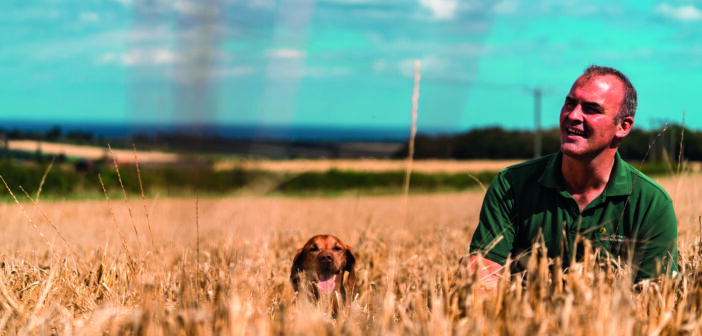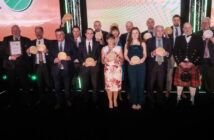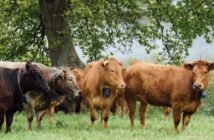Focusing on efficiency and the cost of production across a mixed farming enterprise has paid dividends for one Fife farmer.
Collaboration is key for David Bell, who took home the Farm Manager of the Year award at the National Arable and Grassland Awards this year. When we meet at his farm, in Fife, he’s keen to talk not only about rotations and the acreage covered, but how the wider industry can work together and encourage the general public to be more connected with agriculture.
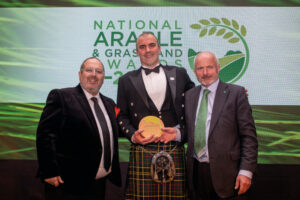
2022 Awards host Justin Moorhouse, Farm Manager of the Year David Bell, and Robert Willey, managing director of sponsor Househam Sprayers
“I’m lucky,” he said. “Both sets of grandparents were in farming so I was brought up in the industry. It’s far more difficult for the next generation to come into the industry, especially at a time when people are more disconnected from their food than ever before.”
As we walk around the farm, David explains how he is trying to play a part in developing new talent in the industry, and how new starters can be a massive benefit to agricultural businesses.
“Experience isn’t everything, especially if the person is willing to learn,” he explained. “What new workers can do is make you question the established way of doing things. Instead of following instructions, they ask why we do certain things the way we do, and this can help identify areas for improvement.”
It helps David to take a more business-like approach to farming. In his entry form for the National Arable and Grassland Awards, he noted that the success of the farm used to be measured by size. His parents took on the two farms owned by his grandparents, totalling 1,000 acres, and doubled it. Now David measures the success of the farm based on the margins and the return on investment. “This is an incredible industry but so many decisions are still made with our gut, instead of using the data available to us.”
Profitability has been ensured by closely looking at the marginal land, benchmarking the yield and using systems like BASF’s xarvio and SOYL to recognise where these areas are and what can be done. Where possible, measures have been taken to improve soil health and bring yields back in line. Where ground is too marginal to justify that expenditure, David has utilised environmental and stewardship schemes.
“It’s helped to firm up our margins and the impact on the overall turnover has been minimal because our efforts and inputs are more focused on the areas that are better suited to food production,” he said.
Investment across the farm has been focused on infrastructure, with David explaining that seemingly small changes can make a significant difference to operations. One of these has been taking out corners in the field, enabling the combine to move between plots with the header still attached, reducing time spent travelling during harvest.
Travel times were further optimised by improving farm tracks with tar plainings so that tractors and trailers can travel faster and safer. David has also overseen the construction of a new general purpose shed on the farm and is in the process of installing a 1,200-tonne capacity cold store.
The right markets
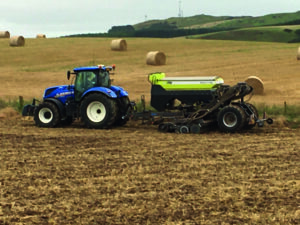
NAGA 2022 Farm Manager of the Year, David uses a Sky EasyDrill for the majority of the drilling, with three hoppers to apply fertiliser and micro-granules simultaneously
The arable rotation comprises winter barley and winter wheat, spring barley, peas and potatoes. Using SOYL, he receives biomass data to manage timings of fertiliser and crop protection products and create variable rate maps. He says that this has the potential to reduce the overall cost of production.
As part of his plan to increase margins, David has developed a part-circular economy on the farm. Winter barley is grown for feed for the 300-head Aberdeen Angus-cross herd. This ensures traceability throughout the finishing process, with progenies finished within 24 months and sold to Marks and Spencer and replacements kept on farm to maintain a closed herd.
Soft winter wheat varieties are grown for feed and distilling, with contracts for early movement sought to take pressure off the limited grain storage and get grain off the farm before November. By marketing the produce up to 24 months ahead of harvest, David believes that he can ensure a good average price for the crop. Spring barley is also grown on contract for distilling, protecting him from the lows of the market.
Potatoes still make up the bulk of the farm’s income, growing a range of varieties for the early salad and pre-pack markets. As the acreage is spread out across owned ground, tenancies and contract farming agreements, David not only adjusts his business plan to maximise market price, but he has also had to consider machinery investment carefully.
“We primarily use New Holland tractors, shod with wide Michelin tyres to minimise soil damage, although when we replace the tyres, we shift to BKT, which have really impressed me despite the lower price point,” he said. “By keeping the fleet under one brand we can minimise servicing costs by using the same filters and oils.”
Frontline tractors are purchased new, but kept for long periods of time, eventually transitioning to lighter duties to limit the risk of breakdowns. “It also means we have a high number of tractors in the yard. This allows us to quickly get back to the work if we do have a breakdown and means we can be self-sufficient when it comes to hauling the crops,” he added.
The farm handles its own combining, using a Claas Lexion 670 with tracks, with straw rotationally chopped and incorporated. Spraying is done with a trailed Amazone UX3200 Super sprayer, unlocked with variable rate and section control. It’s also specified for liquid fertiliser, which is used alongside farmyard manures from the beef herd to boost nutrient levels. Manure levels are boosted by a series of straw for muck deals.
A varied range of cultivation and drilling equipped is used to suit the broad rotation and different soil types. Potato establishment kit comes from ScanStone, with harvesting and cleaning machinery provided by Grimme. A 4m Sky EasyDrill drill handles most of the cereal establishment, equipped with three hoppers for simultaneous fertiliser application and the possibility to spread slug pellets or granular nutrients as required.
“The EasyDrill has been integral to our move to integrated pest management and regenerative farming,” he said. “Where windows allow, we have been establishing cover crops between the cash crops and with the EasyDrill we’ve been able to sow directly into these, some of which are up to four feet tall.”
In difficult seasons, the farm has a 3m Lemken Solitair drill and two Kverneland ploughs on hand for potatoes, or when weather conditions are poor. Most of the cultivation work is done with a Vaderstad TopDown, fitted with a Kverneland air seeder to establish cover crops.
“We have a lot of equipment on the farm, and it represents a high capital cost,” David explained. “To help manage this, I’m not afraid to look for good quality second-hand equipment and take on some of the servicing responsibilities. Not only that, but I’ll also look for non-branded, after-market components which can represent a significant saving.”
Investing in the team
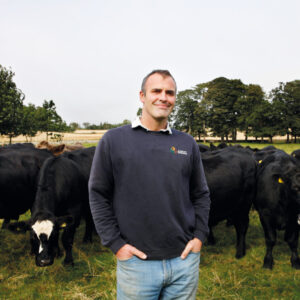
NAGA 2022 Farm Manager of the Year, David Bell
2022 Farm Manager of the Year, David believes that the most worthwhile investment has been in the team, developing their skill levels with first aid training and pesticide approval (PA) chemical application training. He also ensures that they attend workshops and demonstrations to get a broader understanding of how the industry is changing.
“It’s incredible how far agriculture has developed,” he said. “You can’t even say that a basic tractor/implement combination is a simple tool now. There’s a huge amount of technology and it’s important to understand how it works”
David, too, is continuously looking to increase his knowledge about the industry. He sat his FACTS a few years ago to increase his understanding about plant nutrition and has worked closely with AHDB and LEAF to understand his farm and rotation better.
“No one has all the answers. Every farm is different and because of that we can all learn from each other,” he said. “It’s not healthy to have an ‘us against the world attitude’ because there is a place for the different setups that farmers have and by embracing and seeing these ways of working, we can cherry pick what works for us, and all benefit.”
He believes that agriculture needs to be more open and willing to communicate with the general public to improve its image: “We should be inviting politicians and the public on farm so that they can see first-hand how their food is produced and what issues we are facing as an industry. We can be there to educate the people who can provide the solutions and engage with the next generation to show what an incredible industry this is.”
More information
Read about the 2023 NAGA winners, including this year’s Farm Manager of the Year Award winner here.
For news and updates about the NAGA awards, nominees and winners, follow
National Arable and Grassland Awards
#NAGAwards

